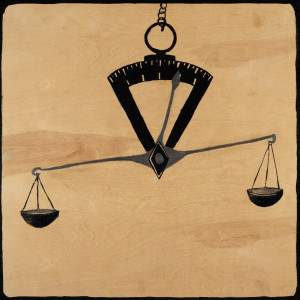
Artist
IMAGES: To download, click above.
Singles:
“Our Little Machine” off And All Things On The Scales
“This Light” off And All Things On The Scales
LINKS:
Supply & Demand
Twitter
Bandcamp
Facebook
Last Good Tooth
Supply & Demand
I’m on the Greyhound between Providence R.I. and New York City, getting lost inside Last Good Tooth’s new album, And All Things On The Scales. The bus is a good place to listen to this band – they have shuttled back and forth between Providence and New York for the past 6 years – and the steady motion sets my mind at ease, ushers in the thick guitars and the heavy-footed drums, the aching fiddle, the naive, genius piano, the cracked smooth voice…
I imagine Last Good Tooth constructing this album from the ground up. They staked their plot deep out in the woods surrounding Hudson NY in the winter of 2014, dressed in misshapen, unnameable clothing, recently escaped from the Americana ghetto and looking for shelter. For construction materials they brought a small army of volunteers: string and horn sections, a haunting, clouded female voice (MorganEve Swain of Brown Bird), field recordings of a wintertime orgy and the Twin Towers falling on 9/11, and – importantly – an entire genre’s worth of complex (and beautiful) melody lines. Somehow the band itself, crambled together out of Penn Sultan (lead guitar, vocals), Alex Spoto (violin), Kevin Sullivan (electric bass), and Arthur Kapp (drums) managed to orchestrate the chaos – to build a house and then hide the nails – giving their music a ramshackle but composed feel which is structured without being overly reverent, and ambient without being lazy.
What are the measurements, what are the materials? And All Things on the Scales is not pop in any easy sense of the term; the first track, Shell, is over seven minutes long. It opens with the first of the expansive, unhurried riffs which seem to be the way the band thinks; what they find as they wander the shore. Walking along the coast, what you see doesn’t change very much but there is a tremendous amount to feel, and it is the same way with Shell as with the immaculately groovy Our Little Machine, or the steady pulse of Operation 2011. The first riff repeats more or less throughout the tune; it is the gradual layering of the first idea that gives the songs form, dynamic, life.
Both Penn Sultan and drummer Arthur Kapp come from families of visual artists, and this comes through particularly in this kind of composition. Check out the shock of the sinister descending line halfway through What I Was Born For, like a flash of vermillion in a seascape, or the floppy saxophone part towards the end of This Light, like a patch of cobalt blue at the top of a shoulder in a portrait.
Sultan is a wiseguy crooner, a sinister baritone, his voice swoons, threatens, pleads, cajoles. It speaks with different tongues – a radio announcer, a public safety expert, that creeping worrying voice in your head when you’ve overstepped your bounds. He sings with the ringing hollow of the public authority inside your head, impressionistic and sardonic at the same time, a tone which splits the difference between an official message (do this now) and a more personal voice (what the hell did I just do?). Consider the song titles for further evidence.
The lyrics are evocative without being too literal. There is a vague unease which colors Sultan’s words, a memory of a bad night, dreamlike fragments of hands reaching across the table for a cigarette, a smile that you found false, a one-liner that catches in the throat. The lyrics’ general quality makes them more threatening by removing their immediate object from the field of view. By not defining the terms precisely, Sultan does what good writers do: he lets the listener bring their own neuroses, memories, and wishes to the table, drawing them in in the process.
Calculating and adjusting, balancing and weighing, for every action an equal and opposite reaction. As the house takes on recognizable shape and dimension, Last Good Tooth keeps the ear active with unorthodox measurements and strange angles. The horns (This Light, What I Was Born For, etc.), sound samples (Operation 2011, Amazing Breakthroughs) and piano elevate the record from a live set to an album that the band actively embellished. Even if the horns aren’t playing on the next song, for example, their possibility echoes throughout. It’s the same with Alex Spoto’s violin: It is not a constant presence, but it does a lot of work in unsettling your expectations, and giving the band a dynamic and wide landscape to play around in. While the album is groovier than any Americana album I’ve heard, Spoto’s fiddling also satisfies the band’s roots influences, which are subdued but present here.
There are other things to talk about and not enough space to do it in, my Greyhound is pulling into the casino. The highest (and most accurate) complement I can pay is that Last Good Tooth has trusted in the intelligence and sensitivity of their listeners enough to make this album. Amidst all the working parts and the tools they have surely had to invent for themselves, the house stands – they strike an honest balance between the everyday and the poetic, the orchestral and chaotic, effort and surrender, scorn and regret.
– Noah Harley



